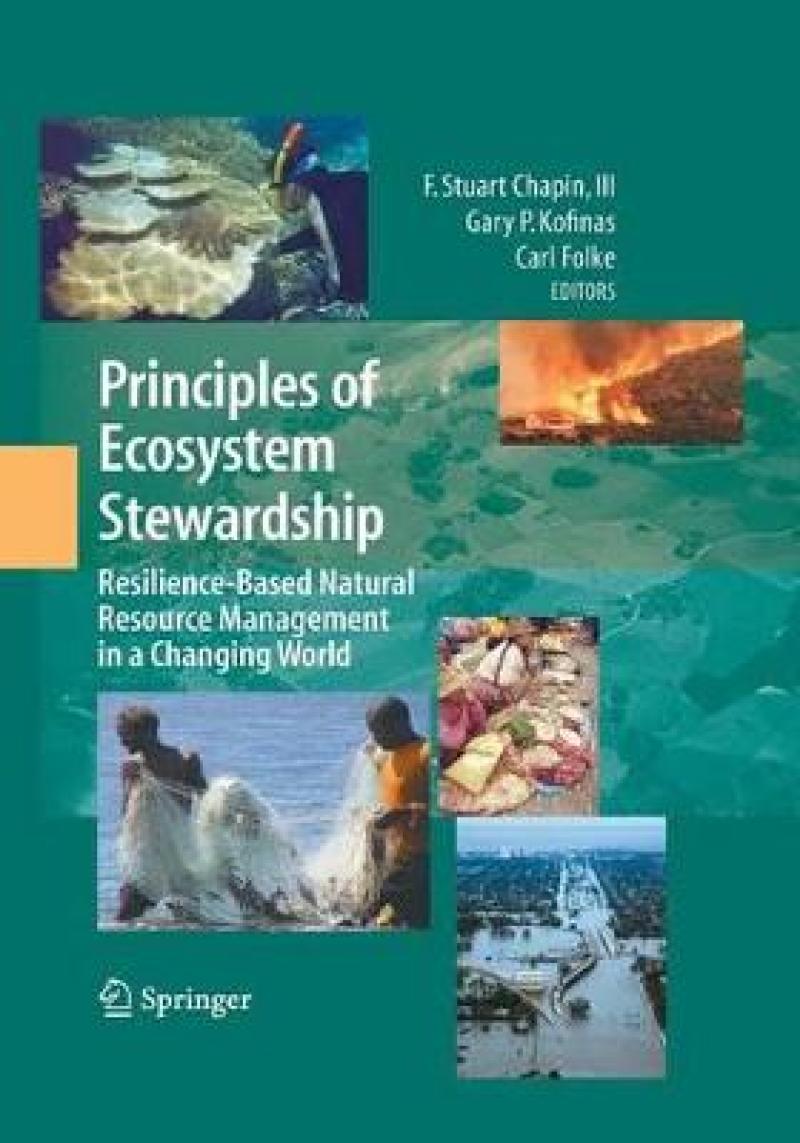The world is undergoing unprecedented changes in many of the factors that determine its fundamental properties and their in- ence on society. These changes include climate; the chemical c- position of the atmosphere; the demands of a growing human population for food and ?ber; and the mobility of organisms, ind- trial products, cultural perspectives, and information ?ows. The magnitude and widespread nature of these changes pose serious challenges in managing the ecosystem services on which society depends. Moreover, many of these changes are strongly in?uenced by human activities, so future patterns of change will continue to be in?uenced by society’s choices and governance. The purpose of this book is to provide a new framework for n- ural resource management—a framework based on stewardship of ecosystems for human well-being in a world dominated by unc- tainty and change. The goal of ecosystem stewardship is to respond to and shape change in social-ecological systems in order to s-tain the supply and opportunities for use of ecosystem services by society. The book links recent advances in the theory of resilience, sustainability, and vulnerability with practical issues of ecosystem management and governance. The book is aimed at advanced undergraduates and beginning graduate students of natural resource management as well as professional managers, community leaders, and policy makers with backgrounds in a wide array of d- ciplines, including ecology, policy studies, economics, sociology, and anthropology.
Les mer
The purpose of this book is to provide a new framework for n- ural resource management—a framework based on stewardship of ecosystems for human well-being in a world dominated by unc- tainty and change.
Les mer
Conceptual Framework.- A Framework for Understanding Change.- Managing Ecosystems Sustainably: The Key Role of Resilience.- Livelihoods and Human Well-Being during Social-Ecological Change.- Adaptive Co-management in Social-Ecological Governance.- Transformations in Ecosystem Stewardship.- Stewarding Ecosystems for Society.- Conservation, Community, and Livelihoods: Sustaining, Renewing, and Adapting Cultural Connections to the Land.- Forest Systems: Living with Long-Term Change.- Drylands: Coping with Uncertainty, Thresholds, and Changes in State.- Freshwaters: Managing Across Scales in Space and Time.- Oceans and Estuaries: Managing the Commons.- Coastal Marine Systems: Conserving Fish and Sustaining Community Livelihoods with Co-management.- Managing Food Production Systems for Resilience.- Managing Densely Settled Social-Ecological Systems.- The Earth System: Sustaining Planetary Life-Support Systems.- Integration and Synthesis.- Resilience-Based Stewardship: Strategies for Navigating Sustainable Pathways in a Changing World.
Les mer
Natural resource management is entering a new era in which rapid environmental and social changes inevitably alter ecosystems and the benefits they provide to society. This textbook provides a new framework for natural resource management—a framework based on stewardship of ecosystems for ecological integrity and human well-being in a world dominated by uncertainty and change. The goal of ecosystem stewardship is to respond to and shape changes in social-ecological systems in order to sustain the supply and availability of ecosystem services by society. The book links recent advances in the theory of resilience, sustainability, and vulnerability with practical issues of ecosystem management and governance. Chapters by leading experts then illustrate these principles in major social-ecological systems of the world. Inclusion of review questions, glossary, and suggestions for additional reading makes Principles of Ecosystem Stewardship: Resilience-Based Natural Resource Managementin a Changing World particularly suitable for use in all courses of resource management, resource ecology, sustainability science, and the human dimensions of global change. Professional resource managers, policy makers, leaders of NGOs, and researchers will find this novel synthesis a valuable tool in developing strategies for a more sustainable planet.
About the Authors:
F. Stuart Chapin, III is Professor of Ecology in the Institute of Arctic Biology, University of Alaska Fairbanks.
Gary P. Kofinas is Associate Professor of Resource Policy and Management in the School of Natural Resources and Agricultural Sciences, University of Alaska Fairbanks.
Carl Folke is Professor and Science Director of the Stockholm Resilience Centre, Stockholm University.
Les mer
From the reviews:
“Throughout the work, chapter contributors link recent advances in the theory of resilience, sustainability, and vulnerability with practical issues related to the management of social-ecological systems. … This book introduces an intriguing new approach to the philosophy of resource management emphasizing proactive policies that shape change for sustainability, in contrast to current reactions to observed changes. Summing Up: Recommended. Upper-division undergraduate through professional collections.” (R. L. Smith, Choice, Vol. 47 (3), November, 2009)
Les mer
Textbook for Natural Resource Management and related courses First textbook to take a resilience-based approach to the ecology and management of resources. It focuses on ecosystems ability to adapt to change Chapin is the author of Principles of Terrestrial Ecosystem Ecology and Plant Physiological Ecology Provides a framework for managing resources in a world dominated by uncertainty and change A systems perspective linking social and ecological systems Includes supplementary material: sn.pub/extras
Les mer
Produktdetaljer
ISBN
9781489996503
Publisert
2014-09-05
Utgiver
Vendor
Springer-Verlag New York Inc.
Høyde
254 mm
Bredde
178 mm
Aldersnivå
Graduate, P, 06
Språk
Product language
Engelsk
Format
Product format
Heftet
Illustratør
Biographical note
F. Stuart Chapin, III is Professor of Ecology in the Institute of Arctic Biology, University of Alaska Fairbanks.
Gary P. Kofinas is Associate Professor of Resource Policy and Management in the School of Natural Resources and Agricultural Sciences, University of Alaska Fairbanks.
Carl Folke is Professor and Science Director of the Stockholm Resilience Centre, Stockholm University.
